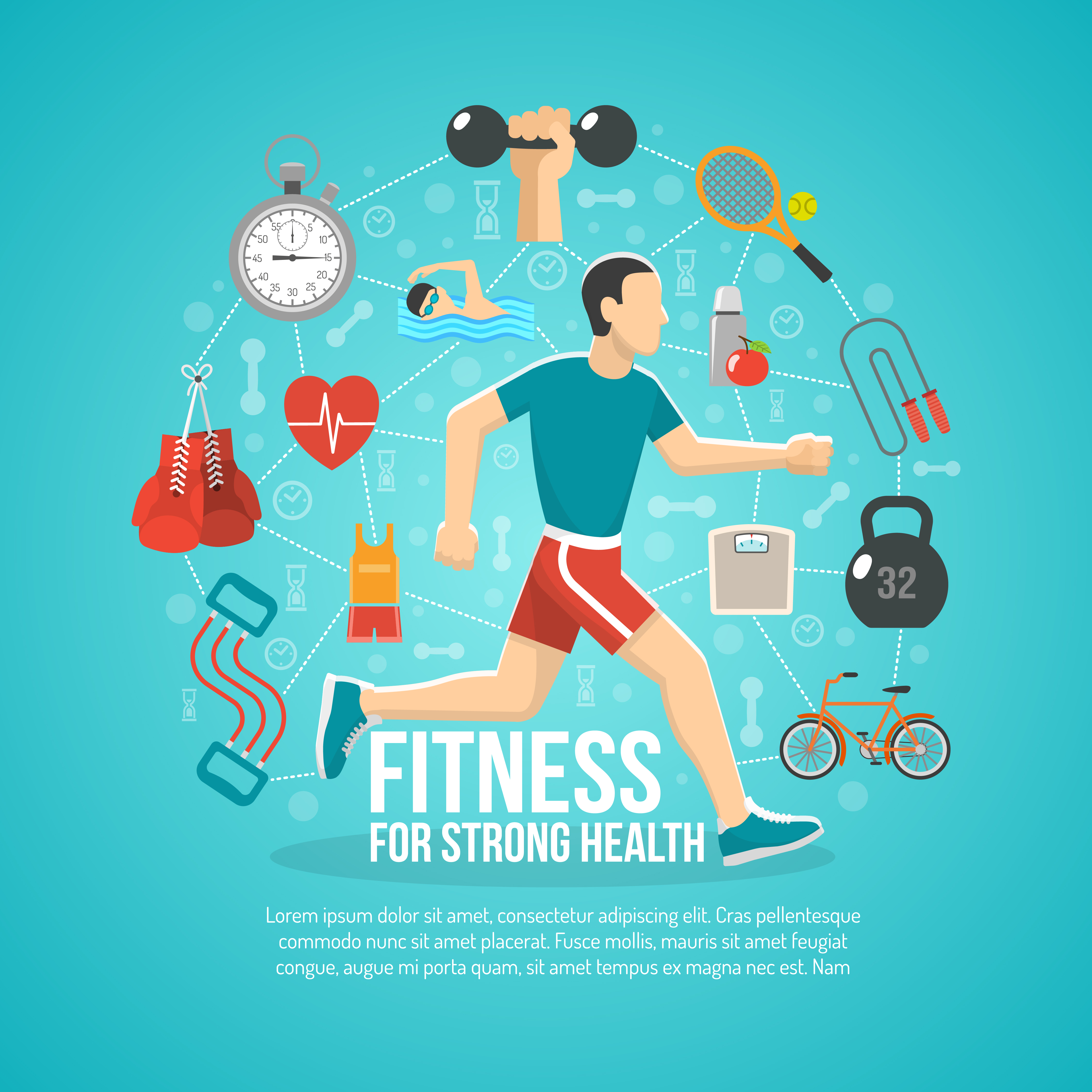THE ULTIMATE GUIDELINE TO FITNESS | FITNESS | FITNESS ADVANTAGES
- Get link
- X
- Other Apps
ADVANTAGES OF FITNESS
Physical fitness is a state of health and well-being and, more specifically, the ability to perform aspects of sports, occupations, and daily activities. Physical fitness is generally achieved through proper nutrition, moderate-vigorous physical exercise, and sufficient rest along with a formal recovery plan.
Before the Industrial Revolution, fitness was defined as the capacity to carry out the day's activities without undue fatigue or lethargy. However, with automation and changes in lifestyles, physical fitness is now considered a measure of the body's ability to function efficiently and effectively in work and leisure activities, to be healthy, to resist hypokinetic diseases, to improve immune system function, and to meet emergency situations.
Fitness is defined as the quality or state of being fit and healthy. Around 1950, perhaps consistent with the Industrial Revolution and the treatise of World War II, the term "fitness" increased in western vernacular by a factor of ten. The modern definition of fitness describes either a person or machine's ability to perform a specific function or a holistic definition of human adaptability to cope with various situations. This has led to an interrelation of human fitness and physical attractiveness that has mobilized global fitness and fitness equipment industries. Regarding specific function, fitness is attributed to persons who possess significant aerobic or anaerobic ability (i.e., endurance or strength). A well-rounded fitness program improves a person in all aspects of fitness compared to practicing only one, such as only cardio/respiratory or only weight training.
A comprehensive fitness program tailored to an individual typically focuses on one or more specific skills, and on age or health related needs such as bone health. Many sources also cite mental, social and emotional health as an important part of overall fitness. This is often presented in textbooks as a triangle made up of three points, which represent physical, emotional, and mental fitness. Physical fitness has been shown to have benefits in preventing ill health and assisting recovery from injury or illness. Along with the physical health benefits of fitness, it has also been shown to have a positive impact on mental health as well by assisting in treating anxiety and depression.Physical fitness can also prevent or treat many other chronic health conditions brought on by unhealthy lifestyle or aging as well and has been listed frequently as one of the most popular and advantageous self-care therapies. Working out can also help some people sleep better by building up sleeping pressure and possibly alleviate some mood disorders in certain individuals.
Fitness Helps You Manage Chronic Disease
Exercise helps the body function, and that includes managing other chronic health problems. According to the Centers for Disease Control and Prevention (CDC), if you have osteoarthritis, high blood pressure, type 2 diabetes, multiple sclerosis, Parkinson’s disease, dementia, or have had a stroke or cancer, physical activity can help. Exercise can help decrease pain, improve insulin sensitivity and blood sugar control, promote mobility, improve heart health, lower the risk of other chronic diseases, and play a role in good mental health.
If you have a chronic disease and you’re looking to stay active or get more active, a walking routine is generally a safe place to start. “The vast majority of people do not need clearance from their doctor to start walking, unless your physician has told you specifically that they don’t want you exercising,” says Sallis.
He says he wishes that more people would look at physical activity as a baseline and that: “You need to get clearance from your doctor not to exercise,” he says.
But if you get excessively short of breath, experience chest pain, or have any other concerning symptoms, call your doctor.
Health Benefits of Exercise
Improved fitness drastically reduces the risk of chronic diseases that develop over time, such as heart disease, type 2 diabetes, and even cancer. “The one thing that will help prevent almost any type of disease is fitness,” says Grayson Wickham, DPT, CSCS, founder of Movement Vault, a mobility and movement company in New York City.
In 2007, ACSM partnered with the American Medical Association to launch the Exercise Is Medicine initiative, with the goal of making physical activity assessment part of routine medical care and providing exercise resources to people of all ability levels. “The scientifically proven benefits of physical activity remain indisputable, and they can be as powerful as any pharmaceutical agent in preventing and treating a range of chronic diseases and medical conditions,” the initiative’s website notes.
Exercise Boosts Your Mood
Regular exercise has been shown to be a buffer against depression and anxiety, according to research. What’s more, other studies show that exercise can help manage the symptoms of depression and help treat it, notes a scientific exercise. Exercise may help reduce inflammation, something that has been shown to be increased in people with depression; it’s also possible that physical activity promotes favorable changes in the brain, too, say the researchers.
Exercise Is Good for Sleep
Habitual exercise can help you get more restful sleep at night. Of 34 studies included in a systematic review, 29 found that exercise improved sleep quality and was associated with longer bouts of slumber. It may help set your body clock (so that you are alert and sleepy at appropriate times), create chemical changes in the brain that favor sleep, and, as past research indicates, can ease pre sleep anxiety that may otherwise keep you up.
It’s worth noting, however, that high-intensity exercise done too close to bedtime (within about an hour or two) can make it more difficult for some people to sleep and should be done earlier in the day.
Inflammation
Studies have shown an association between increased physical activity and reduced inflammation. It produces both a short-term inflammatory response and a long-term anti-inflammatory effect. Physical activity reduces inflammation in conjunction with or independent of changes in body weight. However, the mechanisms linking physical activity to inflammation are unknown.
Immune System
Physical activity boosts the immune system. This is dependent on the concentration of endogenous factors (such as sex hormones, metabolic hormones and growth hormones), body temperature, blood flow, hydration status and body position. Physical activity has been shown to increase the levels of natural killer (NK) cells, NK T cells, macrophages, neutrophils and eosinophils, complements, cytokines, antibodies and T cytotoxic cells. However, the mechanism linking physical activity to immune system is not fully understood.
Weight Control
Achieving resilience through physical fitness promotes a vast and complex range of health-related benefits. Individuals who keep up physical fitness levels generally regulate their distribution of body fat and prevent obesity. Studies prove that running uses calories in the body that come from the macronutrients eaten daily. In order for the body to be able to run, it will use those ingested calories, therefore it will burn calories. Abdominal fat, specifically visceral fat, is most directly affected by engaging in aerobic exercise. Strength training has been known to increase the amount of muscle in the body, however, it can also reduce body fat. Sex steroid hormones, insulin, and appropriate immune responses are factors that mediate metabolism in relation to abdominal fat. Therefore, physical fitness provides weight control through regulation of these bodily functions.
MindBodyGreen : https://www.mindbodygreen.com
Well+Good : https://www.mindbodygreen.com
- Get link
- X
- Other Apps






Comments
Post a Comment